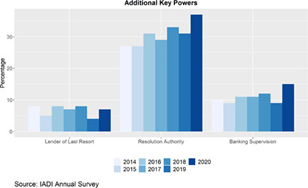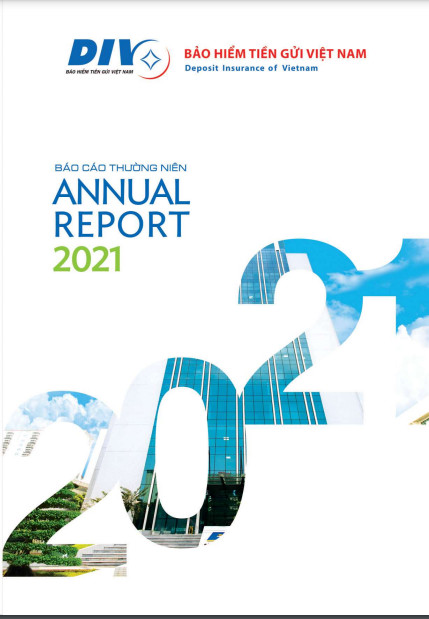In fact, the role of DIV in participating in the process of restructuring the credit institution system, especially with weak credit institutions in general, is increasingly enhanced, thereby protecting the legitimate rights and interests of depositors and maintaining the stability of the system of credit institutions, ensuring the safe and healthy development of banking activities.
To date, the restructuring of the system of credit institutions has been implemented drastically by the banking industry and achieved positive results. The system of credit institutions generally operates stably, liquidity is guaranteed, cross-ownership is reduced, and bank failures and bankruptcies are not allowed to occur. People's confidence in the banking system and the VND is strengthened and guaranteed. Lending interest rates have tended to decrease gradually and have been stable until now, helping businesses save costs when borrowing money from banks to expand production and business. However, restructuring weak banks still faces many difficulties and obstacles.
Restructuring weak banks in difficult conditions
During the question session before the National Assembly on November 6 on the issue of restructuring weak banks, Governor of the SBV Nguyen Thi Hong said that building a project to restructure weak banks is very difficult job.
"Under normal conditions it is difficult, in the context of the economy being affected by the Covid-19 epidemic as well as fluctuations in the world economy, restructuring weak banks is even more difficult. Building a project is difficult, complex, and unprecedented while the capacity of the people participating in the construction project is also limited," Ms. Hong said.
In particular, Ms. Hong also mentioned that finding investors to participate on a voluntary basis is also difficult. The policy mechanism supporting this also needs to be consulted at the agency level for consensus.
"For these banks, we also asked for opinions from competent authorities and are in the process of taking steps according to this plan so that before completing the detailed project, we will submit it to competent authorities for approval and will implement this project," Ms. Hong emphasized.
Previously, the SBV announced to collect comments from organizations and individuals on the dossier proposing to develop a Law amending and supplementing a number of articles of the Law on Credit Institutions. In particular, related to personnel issues when participating in restructuring weak banks, the SBV also pointed out some shortcomings.
Specifically, the current Law on Credit Institutions stipulates: Officials and managers at department level or higher in enterprises in which the State holds 50% or more of charter capital, except those appointed as management representatives. The manager of the State's capital contribution at a credit institution must not be the Chief Accountant, Branch Director, or Director of a subsidiary of the credit institution.
However, in recent times, to carry out the task of restructuring weak credit institutions, the SBV has appointed a number of civil officials or leadership personnel at department level or higher at commercial banks (Commercial banks with over 50% of charter capital held by the State such as VietinBank, Vietcombank) participate in restructuring and hold positions in the Board of Members/Board of Directors, Executive Board, and Supervisory Board at a number of credit institutions under special control (Dong A Bank) and compulsory purchasing banks (GPBank, OceanBank, CB).
Therefore, the SBV believes that in order to create a legal corridor for appointing and receiving back the old unit when the work is completed, and at the same time not contrary to the provisions of Article 33 of the Law on Credit Institutions, it is necessary to have exceptions made for the above mentioned groups of subjects.
In addition, the SBV also proposed a mechanism to exempt inspection and supervision officials from legal risks in the process of resolving weak credit institutions.
Because according to the management agency, resolving weak credit institutions is a difficult and complicated issue and causes legal risks for the SBV in general as well as officials directly involved in the process of restructuring authorized credit institutions under special control.
This greatly affects the psychology of officials (in fact, many officials have resigned or asked to be transferred when assigned to perform tasks related to resolving weak credit institutions, including participating in Special Control Board) because the law does not have a mechanism to exempt these officials from legal risks. This has impacted and negatively affected human resources to handle weak credit institutions, thereby directly affecting the effectiveness of handling weak credit institutions.
Thus, the process of restructuring weak credit institutions still has many difficulties that need to be resolved, especially personnel issues.
Enhance the role of DIV in early intervention of credit institutions
In the revised Law on Credit Institutions project, the issue of early intervention is an issue of interest to many National Assembly delegates. One of the notable points is that this draft renews the intervention process early for credit institutions and in support measures at the early intervention stage, based on support measures during the special control stage, the draft Law adds support measures from supporting credit institutions, at the same time. At that time, there was the participation of DIV and Vietnam Cooperative Bank. These are all resources mobilized from within the credit institution system, enhancing the responsibility of credit institutions for maintaining and ensuring system safety, while reducing pressure and costs for management agencies in the process of resolving weak credit institutions.
Specifically, for participation in the early intervention process of DIV, to promptly protect the interests of depositors and ensure the safety of the credit institution system, the SBV has documents applying for early intervention that at least include the following contents: Status and reasons why credit institutions need support from DIV. Depending on the current situation, nature, and level of risk of the situation requiring early intervention of credit institutions and foreign bank branches, DIV can participate in one or more of the following early intervention measures: develop a reimbursement plan; special loans to support liquidity when credit institutions are at risk of insolvency or falling into a state of insolvency, threatening the stability of the system; and to support the implementation of remedial plans, support plans before special control, compulsory transfer plans...
In Vietnam, the SBV is the main responsible agency for early detection and timely intervention of weak credit institutions. DIV supports the SBV in the process of early detection and timely intervention through remote supervision and on-site examination and participation in special control processes.
In recent years, DIV has actively deployed effectively two operations of supervision and examination, especially in-depth examination under the direction of the SBV to detect and recommend the SBV to promptly handle violations of regulations of the Law on deposit insurance, contributing to limiting fraud and profiteering of insurance proceeds to better protect the legal rights of depositors; Early warning of risks threatening safety in the banking system.
Regarding participation in special control, in the amended Law on Credit Institutions (2017), in addition to participating in special control, the role of DIV is raised one step further when assigned additional tasks during the restructuring of credit institutions such as: Participating in assessing the feasibility of recovery plans, merger, consolidation, and transfer of all shares and capital contributions; Participating in developing bankruptcy plans; special loans; Buying long-term bonds from supporting credit institutions…
The addition of DIV's participation in the early intervention process (in the draft revised Law on Credit Institutions) shows the role of the deposit insurance organization in ensuring system safety, as well as participating in restructuring. credit institutions, protecting the legal rights of depositors is increasingly emphasized.
However, to make the most of the resources of the deposit insurance organization, many opinions believe that it is necessary to amend the Law on deposit insurance soon to ensure synchronization and consistency with the provisions of the Law on Credit Institutions. In particular, clearly orient the use of deposit insurance tools in the early intervention process through clear regulations on the rights and obligations of deposit insurance organizations. It is vital to add authority for DIV to participate in restructuring and resolving weak credit institutions in a more specific way, which does not exclude the addition of DIV personnel to the team participating in restructuring weak credit institutions.
Along with the process of perfecting the legal basis, determining the financial mechanism to serve this activity is extremely important and needs to be regulated in legal documents. To make the most of the resources of the deposit insurance organization, it is necessary to amend the Law on deposit insurance soon and improve the financial capacity and resources for the DIV.
In the Deposit insurance development strategy to 2025, with orientation to 2030, solutions for improving financial capacity for deposit insurance organizations are stated. Accordingly, strengthening financial capacity by allowing the deposit insurance organization to diversify its investment forms and portfolios, including: Buying and selling bonds guaranteed by the Government; Depositing money at commercial banks with good operating quality; Buying and selling bonds, promissory notes, bills, and certificates of deposit issued by commercial banks with good operating quality; Buying and selling local government bonds according to the provisions of the State Budget Law, Public Debt Management Law, guiding documents and have high credit ratings. In addition, adding a form of loan from the SBV in case the deposit insurance organization's capital source is not enough to pay insurance; Develop a project to access capital support in case the deposit insurance organization's capital is temporarily insufficient to pay out.
Regarding the issue of personnel participating in restructuring weak credit institutions, the deposit insurance organization selects and proposes qualified and experienced officers who are key officers for the SBV to decide, and personnel are dispatched according to regulations. Therefore, in case it is necessary to send a large number of officers to take on tasks at a weak credit institution, DIV will have difficulty screening and selecting personnel. On the other hand, sending officers to take on tasks at credit institutions is under special control, if implemented on a large scale, it will also have some disadvantages.
Having a certain impact on staff planning, DIV temporarily lacks high-quality human resources. This requires DIV to constantly train and improve the quality of internal human resources, carry out systematic human resource work, and plan for situations where it is necessary to appoint officers to take on tasks at the request of the SBV.
Communication Department



























